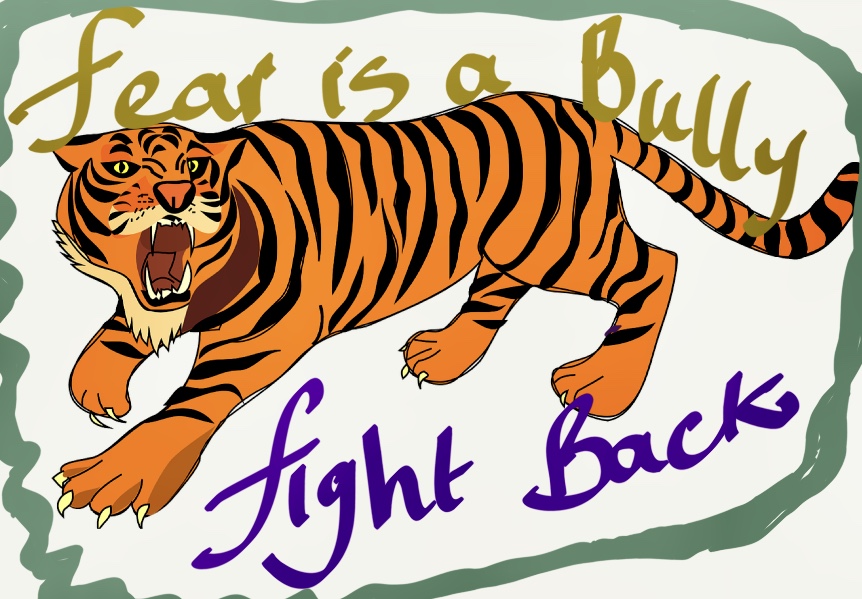Fear Is A Bully
Fear is indeed a bully!
It grabs a hold of you and grips fast;
If you let it, it will paralyse you.
It transfixes you like a deer in headlights;
And, before you know it, you’re knocked off your feet.
Fear Is A coward Too…
If you fight back it runs away.
You already have an arsenal of weapons to fight with,
but fear’s tactic is to terrorise you into forgetting them and leaves you feeling helpless.
Dig deep, you will find what you need, and start fighting back.
What Is Fear?
Fear is an emotional response triggered by an awareness of threat – real or imagined, which causes psychological, emotional and physical changes in the body.
This can make us hide, run away or freeze up.
Fear – usually seen as a negative emotion which can imprison us; preventing us from doing things we need or want to do… But is sometimes a very important thing which serves to keep us safe from harm, as it moves us to deal with danger…eg moving speedily out of the way of a runaway vehicle.
Whilst some people find the emotion of fear unbearable therefore avoiding it., others seem to run to it, finding it pleasurable… adrenaline junkies for example.
How Do We Develop Fear?
Most fear is learned, but we are born with only two instinctive fears – fear of falling and loud noises.
Have you ever noticed how a baby reacts when it senses that it might be falling? Or when it hears a loud sound?
I remember being afraid of loud noises up to when I was about 8 years old.
Christmas time was a terrible time for me, and I remember one occasion running to hide under the bed with the dog when my family were letting off firecrackers…That was my flight response.
Other fears are learned usually through association, environmental influences or culture; and we can learn to become afraid of anything – eg darkness, heights, being in a crowd or in open spaces, snakes, spiders, failure, ridicule, being laughed at…
Some Strategies To Deal With Fear
Stop and bring your mind back to where you are now
1 – Name Your Fear, Make It Clearer
Define your fear to make it more clear, because lack of clarity can make it much larger in your mind.
Break it down simply so you can understand it better and bring it down to size.
For example, you could say ‘I am afraid of driving somewhere I don’t know because I don’t want to get lost, and I will never find my way home again’.
Bringing your fear to front focus makes it less scary; you can put a tag to it and start to plan to get over it.
2 – Sit Still, Accept And Observe It
Running away from your fear is a very common response, but this keeps you locked into what you fear.
It is much better to accept the feelings and emotions that are attached to your fear and take a good look at them quietly.
The next time this fear takes a hold of you, look at it, don’t avoid it. Observe what is happening to your mind and body. Allow these feelings to come and go; don’t avoid or push them away.
Keep focus and not allow your thoughts to wander away from the fear…if your mind wanders bring it back into focus on the fear your experiencing.
3 – Think Of The Worse That Can Happen
Weaken the grip of your fear by thinking of the worse that can happen.
For example, if you’re afraid of getting lost, think what would happen if you did… you could always ask someone to give you directions, and to be safe you could always go into a shop and ask someone directions to set you on you your way.
Nowadays with sat nav – in your car or on your smartphone – you could always re-set it to direct you to where you need to go.
You could always do this exercise with someone you trust to help you keep control of your anxiety.
4 – Revise The Fear Into Something More Real
Root out what you’re telling yourself about this fear you have – ‘I am going to get lost and I won’t find my way home, and I’m going to drive all over the country and I’ll never get home’, ‘People are going to look at me and think I’m stupid’. ‘I am going to look/feel like an idiot’.
As fear is triggered by automatic negative thinking, diagnosing these thoughts provide the way to question the fear aspect with logical thinking.
Question the frequency of what makes you afraid actually happens; where is the proof?
Revise your thoughts using the current thinking ‘no one really gets lost, I always have my telephone at hand and can always call someone to direct me to where I want to be’.
5 – Take Small Steps To Face What’s Making You Afraid
To really get over your fear you must look it in the eye.
Take small steps and work through stages of uncovering your fear.
Each time you’ll become more confident to move on to the next step.
For example, before you start your journey, check the map, see how far away you’re going; identify places along the route that you already know. If you have a sat nav you can also see different ways to get to your destination.
Do a daily journal about the fear that paralyses you, you’d be surprised how much this helps you to gradually get over it.
6 – Do Something Courageous
An effective way to fight fear is by doing something brave.
Make a list of things you can do to feel stronger, confident and free from fear.
Try to do one weekly, to gradually become more confident and, you can always take someone with you when you do this for the first time, then do it solo the next time.
7 – Ask Friends And family – Who You Trust – For Support
It’s surprising how much easier things become when you talk to someone about what makes you afraid.
They can bring a whole new perspective on things and could help you to find ways to work through your anxiety.
To see the first blog in the ‘Fear’ series – Fear Holds Us Back…Click here
Click HERE to see the next post
References
www.psychologytoday.com/gb/blog/recovery-road/201405/what-is-fear
https://edition.cnn.com/2015/10/29/health/science-of-fear/index.html
https://kriscarr.com/blog/how-to-overcome-fear
www.paulekeman.com/universal-emotions/what-is.fear
https://m.wikihow.com/Stop-Living-in-Fear
Feel The Fear And Do It Anyway by Susan Jeffers



After reading this blog it makes you aware what a bully & coward fear is. Thoroughly enjoyed –
Well done Thelma! Xx
I glad this is helpful in allowing one to see how they can logically analyse their fear and work on ways to neutralise it and move on to do what they need do do in their lives.
There will be follow-ups on this topic over the coming weeks. Xxxx
A great blog post and a really helpful reference tool. Perfect for the fight to combat anxiety and irrational fear. Thank you.
I’m encouraged by the positive feedback on this post as I felt that, especially at this time, many of us are experiencing fear of one kind or another, and are transfixed by it. This post, and others in the series, are designed to help us to stand still and take stock of the fear that’s holding us back and develop simple strategies to work through them. Look out for the next one in the series.
Great read, this reminds me me of my fear of going to bed and not getting enough sleep. The anxiety and fear was keeping me up at night. I now realise the steps you have mentioned are what I used and now I feel a lot more relaxed.
Fear can stop you from fulfilling your potential.
Yes, fear can really be a major hindrance to peace of mind and it can be so irrational and without logic. `It’s a pity we are not taught how to deal with the things we fear from a young age, so many of us would have less problem with anxiety and depression.
A great blog Thelma. Putting the proper perspective on fear is a must for everyone because that’s how they release its stranglehold over them. Stand up to a bully, whether the emotional or physical one , and see how they back down.